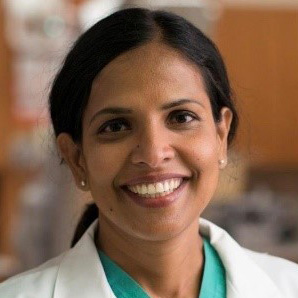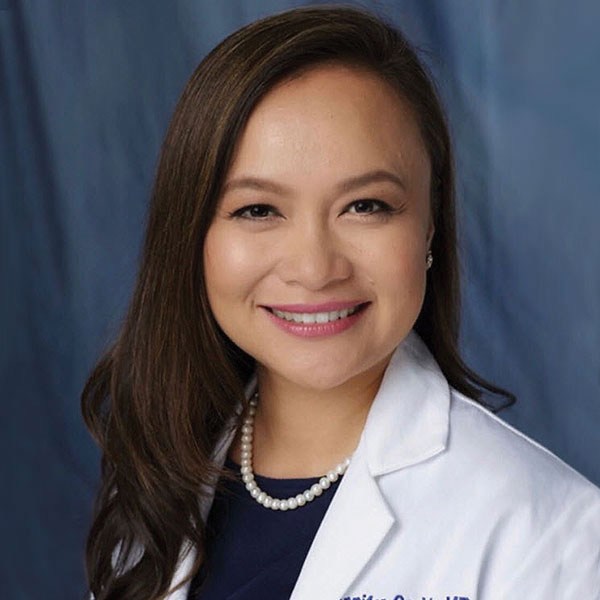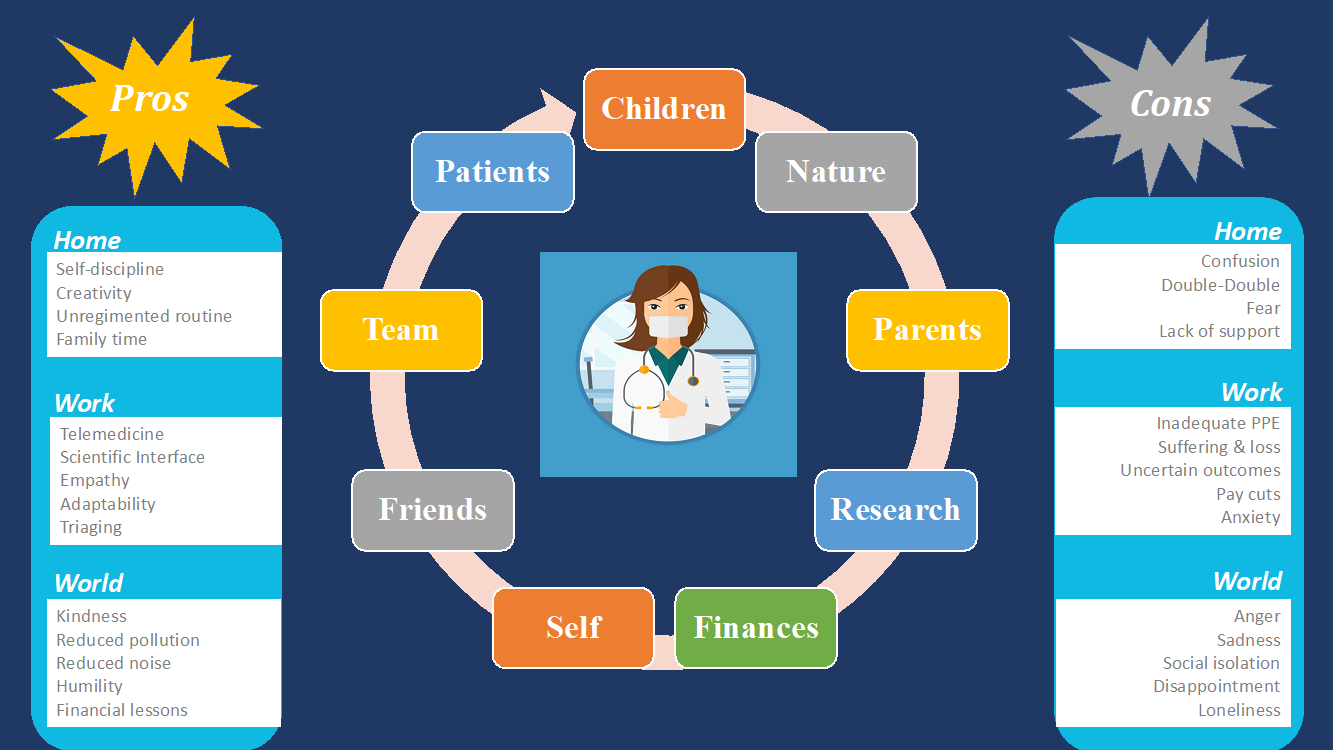|
Pros
Kamala P. Tamirisa, MD, FACC

"Look for a break in the clouds."
Covid-19 has brought the world to a grinding halt. It has left a trail of tears and uncertainty. On a personal level, our family lost someone we loved dearly. His lonely passing without final goodbyes was tough to endure. Despite this, I continue to tread on the path of realistic optimism and positive resilience. Mind you, I am not a psychologist. I am a cardiologist. I use these terms loosely as I pen my thoughts on "Pros of the Covid-19 story" for the ACC WIC Section. |
Cons
Jennifer Co-Vu, MD, FACC

"Rain falling slow, down the roofs of uncertainty."
COVID-19 has put millions on the edge, and everyone was suddenly placed in a state of emergency. I thought I was resilient: my family is good, sheltered at home and healthy. Having endured a massive earthquake, volcano eruption, typhoons and hurricanes, I thought this will not be as bad. One week passed, then two, three, then eight... my optimism slowly began to fade away as it became harder to stay positive. Here are my thoughts on "Cons of the COVID-19 story." |
|
As a Mother
- Creativity: With schools closed, the clock is not running my children's lives anymore. Lack of regimented routine has left room for expressiveness and ingenuity – music production, creating art and exploring online coding. Kids are relishing non-curriculum books without the pressure of time.
- Self-discipline: My children have taken structure into their own hands by self-made daily calendars with study, exercise and game times. It has been uplifting to see this early maturity!
- Family time and responsibility: Flexibility has allowed time for family movies, board games, help with chores and taking on responsibility in our dual-physician household (helping elderly grandparents or younger siblings).
|
As a Mother
- Confusion: With the sudden closure of schools, most parents were at a loss and ill-prepared, now forced to homeschool our children. There has been a steep learning curve for the students, teachers and parents on how to navigate the new world of "virtual learning."
- Double-double: In most households, women bear most of the responsibility of keeping the house in order. Never has it been more magnified than during this pandemic. Even in most dual-physician households, women carry the brunt of the household work and the logistics of everyday homeschooling, grocery shopping, etc. on top of being on the frontlines.
- Lack of support: As schools and daycares closed, most health care workers were still expected to report to work. Grandparents who helped with childcare were suddenly out of the equation as we try to limit their exposure. Babysitters were reluctant to come due to the same fear of exposure. Most were then left with the stress of straddling between clinical schedules and childcare/homeschooling.
- Fear and Worry: Most health care workers' biggest fear: bringing coronavirus home. I began wearing scrubs and started the new ritual of removing clothes in the laundry room, followed by heading straight to the shower for a thorough "decontamination." Worried children have been continually reassured that we take precautions so we do not get infected or expose our family.
|
|
As a Physician
- Adaptability: We, as physicians, have shown the world that we are malleable and adaptable. I am proud to see that we have stepped out of our comfort zones to manage ventilators, volunteer in emergency departments and ICUs. We also adapted quickly to fluid policies and schedules as they evolved.
- Interface: Never in medicine have we seen such an extensive exchange of scientific dialogue across fields. Everyone joined hands, with one goal, to alleviate suffering by empowering each other intellectually while fulfilling our duties with empathy.
- Telemedicine: Covid-19 gave us no choice but to enforce social distancing. This opened new avenues for us to continue to provide care for our patients through virtual medicine. Increased efficiency, convenience and minimizing exposure to COVID-19 have been the highlights of telemedicine. The forgotten art of taking a detailed health history, to form a diagnosis, has been refreshed. Relaxation of government regulations for billing have helped to ensure patient care while keeping practices afloat.
- Triaging: With limited resources and PPE, we have become experts at reallocation of resources and patient triaging by categorizing procedures as elective, urgent and emergent. We have taken a step back, to question if the procedure or test is really necessary or not. I hope, even after the pandemic, we continue to approach the U.S. health care system with "need driven care," instead of "revenue driven care."
- Time for science and self: The down time has allowed physicians more time for writing, publishing, reading scientific and nonmedical books, as well as pursue hobbies including yoga, exercise, art and music.
|
As a Physician
- Uncertainty: Physicians around the world turned to each other on how to best manage a novel virus. What is the clinical course? Spread? Most vulnerable population? Normally, questions like these were answered by random clinical trials or meta-analyses, but in the brink of a pandemic, we now have a disease with no known treatment. All treatments are trial-and-error. CDC changed recommendations almost every other day. For most physicians came this challenge: "Are we trained enough to function in uncertainty?" Physicians were learning as they go, and not being able to offer definitive plans for patients is extremely distressing.
- Shortages: The media has used war metaphors to portray the medical community's pandemic fight, in the light of PPE shortage. We were "soldiers going to war unarmed" as we reuse our masks and have inadequate PPE. There were shortages of COVID-19 testing kits, and even health care workers who were exposed could not get tested. Hospitals eventually realized how ill-prepared they were with shortages of ventilators, beds, and personnel.
- Triaging: In most states, hospitals were mandated to halt elective procedures and clinic visits during the initial weeks. Balancing benefit vs. risk of any procedure or visit to prevent further health decline had become a stressful day to day task among physicians.
- Deaths and Anxiety: By the time this pandemic is over, it has been said that most everyone will know someone who has been infected or died of COVID-19. I have three friends who got infected and recovered, but I also had a medical school classmate and several mentors who died from COVID-19. Yet another crisis is looming as more health care workers suffer from PTSD, depression and anxiety, which has sparked a rise in suicide rates. Due to these deaths, a lot of health care workers have thought about their own mortality and started or updated their wills.
- Lack of Academic Productivity: As the amount of research on COVID-19 increase exponentially, reports show that women are not as academically productive as our male counterparts. Women's research productivity has taken a backseat, likely due to managing both clinical work and maintaining the household.
- Financial: The pandemic has also catalyzed a rapid economic collapse. Most hospitals were not immune to this financial downturn, as most elective procedures, admissions and clinic visits were halted. Physicians and other health care workers experienced pay cuts and staff were furloughed or laid off.
|
|
As a Fellow Human Being
- Kindness: The global suffering has led to introspection – being kind to ourselves and others and encouraging us to build bridges across geographical barriers. We are more sensitive to others' difficulties because we are all in the same boat. Setting up mental health support groups, talking openly about PTSD, stress, making masks and volunteering to help in hot spot areas are some of the kind gestures that sprouted out of this shared suffering.
- Humility: The philosophical side of life is the grounding patch. Humans are not indestructible and life is unpredictable. The pandemic has made these distant statements crystal clear for us. We learned that nature should not be taken for granted. Nobody would have predicted six months ago that the world will grind to a halt at the power of a virus in this day and age when mankind is proud of its conquest over nature. Remaining humble keeps us on our guard without living a reckless life – to not overstep natural boundaries.
- Financial: With the economic pressure, we have learned the value of prudence with finances and savings. "Save for the rainy day" is a timely proverb for these times. Also, it has opened people's hearts to pursue philanthropy.
- Advocacy: Demographics have highlighted racial and economic disparities in COVID-19 survival and outcomes, giving us yet another reason to be instruments for change towards equality. Sometimes health care policies felt like they did not adequately reflect physician scientific views. The pandemic has reiterated the need for physicians to have a stronger voice in health care policies instead of being silent spectators.
- Renewed Respect. The world at large has recognized the selfless service of health care workers during these dire times. While we are not craving for laurels, gratitude kindles the service spirit.
|
As a Fellow Human Being
- Anger: Conspiracy theorists started coming out as quick as this pandemic screaming, "It's all fake!" These "Coronavirus Deniers" think this pandemic is a hoax and have total disregard for social distancing. As most people quarantined at home (and inexplicably hoard toilet paper), these people continue to spread misinformation, angering a lot of health care workers who sacrifice their lives and their family.
- Social Isolation: "Man is by nature a social animal." With the necessary social distancing comes its more nefarious cousin, social isolation. I must admit, I miss my family and friends. I miss traveling and eating out. This necessary, but still unusual, new reality can affect most people and could trigger PTSD, anxiety, fear, substance abuse and loneliness.
- Disappointment: This pandemic demanded a coordinated nationwide, if not worldwide, approach. With all the uncertainties, the lack of direction and necessary leadership has become more apparent, resulting in increasing deaths and failure to truly "flatten the curve."
- Sadness: Seeing how fragile this world has become in the hands of a deadly virus, the world will never be the same even after this vicious enemy retreat. All the deaths, loss of income, economic downfall, global suffering and the uncertain future has left us... lost.
|
"Sometimes it is hard to see the hidden sunshine behind the dark clouds. But, with firm conviction of hope, faith and time, the sunshine will brighten the World all over again!" |
"Humankind is made for uncertainty, struggle, choice and change." |


